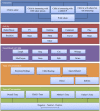Ear for recovery: protocol for a prospective study on parent-child communication and psychological recovery after paediatric injury
- PMID: 25652805
- PMCID: PMC4322211
- DOI: 10.1136/bmjopen-2014-007393
Ear for recovery: protocol for a prospective study on parent-child communication and psychological recovery after paediatric injury
Abstract
Introduction: One in six children who have been admitted to hospital with an injury develop persistent stress symptoms that put their development at risk. Parents play a crucial role in children's psychological recovery, however, it is unknown how specific parenting behaviours can help or hinder. We aim to describe the nature and quantity of parent-child communication after a child has been injured, and to examine how these interactions are related to children's psychological recovery.
Methods and analysis: We are conducting a prospective observational study among children aged 3-16 years, who have been admitted to a tertiary children's hospital with a serious injury. Data collection involves a naturalistic observation of spontaneous, everyday parent-child communication at home, shortly after discharge, and an assessment of children's psychological recovery at 6 weeks and 3 months post-injury. Main analyses comprise descriptive statistics, cluster analysis and analyses of variance.
Ethics and dissemination: This study has been approved by the Human Research Ethics Committee of the Royal Children's Hospital Melbourne (33103) and Monash University Human Research Ethics Committee (CF13/2515-2013001322). We aim to disseminate the findings through international peer-reviewed journals, international conferences and social media. Participants will be sent a summary of the overall study findings.
Keywords: MENTAL HEALTH; PAEDIATRICS; SOCIAL MEDICINE.
Published by the BMJ Publishing Group Limited. For permission to use (where not already granted under a licence) please go to http://group.bmj.com/group/rights-licensing/permissions.
Figures
References
-
- Turley MR, Obrzut JE. Neuropsychological effects of posttraumatic stress disorder in children and adolescents. Can J Sch Psychol 2012;2:166–82. 10.1177/0829573512440420 - DOI
Publication types
MeSH terms
LinkOut - more resources
Full Text Sources
Other Literature Sources
Medical

